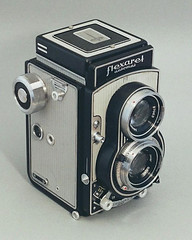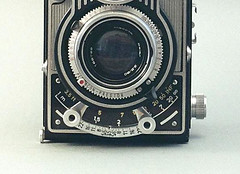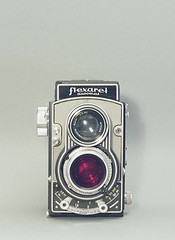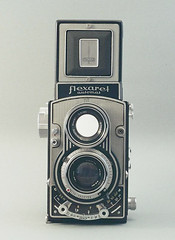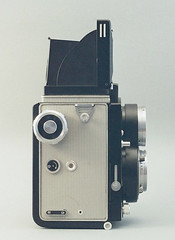Introduction[]
The Flexaret VII is the last in a series of TLR cameras made by Meopta (and its predecessors) in the former Czechoslovakia. It's a fully mechanical camera with an all-metal body. It has a solid feel to it and has some advanced features mirroring Rolleicord and Rolleiflex models from the same period.
For example: you can set the light value on a mechanical ring. This sets a series combinations of shutter speeds and diaphragms. When you decide you need to stop down the lens a little more, there's no need to choose the shutter speed any more. This feature is also found on some Hasselblad lenses and on several Rolleicord and Rolleiflex TLR models from 1954 onwards.
Transport and shutter[]
Winding the camera transports the film and cocks the shutter at the same time. It takes quite a lot of force to wind this camera. In principle, there's no danger of double exposures with this system. There is however, a way to make double exposures: On the right hand side of the camera it has a button that glides up to cock the shutter without transporting the film. There is also a small switch just above the shutter which can be used to prevent accidental firing of the shutter (at least on the Standard).
One of the few ways to distinguish an Flexaret VII from a Flexaret VI is the maker of the shutter: the VII has a Pentacon Prestor shutter with a top speed of 1/500s whereas the VI has a Metax shutter with a top speed of 1/400s.
Keep in mind, however, that the Flexaret VIa also has a top shutter speed of 1/500s with the Prontor SVS shutter. Luckily, there is a way to distinguish a VII from a VIa: the double exposure function is not available on the VIa.
Lens and focus[]
The lens is a Belar 80/3.5, made by Meopta itself. It has a reputation of having rather soft coatings. It gives very nice results, though. It is probably wise to use a lens hood on any TLR. Focusing is done by a sort of anchor on the bottom of the taking lens, just like on the Minolta Autocord I. This anchor can be set to operate steplessly or with "clicks" on 1m, 2m, 3m, 10m distance and infinity. Choosing between these two modes is done by a small metal switch on the left of the camera. On the Flexaret VI, VII and Standard, Meopta used a B36 bayonet mount for filters. This means filters produced for the earlier Flexaret models can not be used. The lens tube has both an internal bayonet (for filters) and an external one (B40 bayonet) to mount the hood.
Optional items[]
There are a few optional devices available for the Flexaret camera's, these include following items:
- A 35mm insert so you can use normal cartridges instead of rollfilm (this counts from the IVa till the VII, Flexaret I till IV and the Flexaret Standard cannot take this adaptor). Note that there are 2 type of inserts made. There is an insert for the IVa, the V and the early (black) VI (which has a serial below 50,000), the other insert is suitable for the (grey) VI and VII.
- 35mm viewfinder (not rangefinder) to be used with the 35mm insert, it's not that common but it pops up on ebay from time to time at affordable prices.
- For the Flexaret VII (and Standard) you can even use a 6×4.5 mask (other masks like a 4×4 also exists but seem to be rare)
- Two sets of macrolenses are made, one for 1m to 0.5m and one for 0.5 to 0.33m. The lenses always come in pairs (one thick for the viewing lens and one thin for the taking lens), the one for the viewing lens has parralax correction. Macrolenses made for the Flexaret I to Va will not fit the VI, VII and Standard (and Vice versa of course)
Images[]
Links[]
- Flexaret V Review by BKSPicture
- Meopta Flexaret VII at www.collection-appareils.fr

